Science issues are part and parcel of contemporary civic discourse. Many people hope that advances in science will improve people’s lives and enhance the economy. They are anxious to understand what innovations will disrupt existing daily activities and business routines. Policy arguments about science-related issues have held center stage during President Barack Obama’s tenure, starting with the protracted arguments over medical care, insurance and the Affordable Care Act, and extending into every cranny of energy and environmental concerns, policies about food, challenges created by digital technology disruptions, and whether educators are preparing today’s K-12 students for a future with greater requirements for science literacy and numeracy.
One of the key puzzles behind these debates concerns the underpinnings of public attitudes on science-related topics and whether divisions in society are largely explained by political views, religious affiliation or educational attainment, or if they are explained by other factors, such as age, gender, race and ethnicity. This report pulls together these findings to look at the broad patterns underlying the public’s attitudes on science issues.
The Role of Political Party and Ideology
There has been a growing divide among Republicans and Democrats over the past few decades into increasingly ideologically uniform “silos.” A larger share of the American public expresses issue positions that are either consistently on the liberal or conservative side today than did so two decades ago and there is more alignment between ideological orientation and party leanings.8 Political polarization is evident in a wide swath of public views about expressly political topics that are hotly debated and covered in the news media. The polarization also extends beyond policy debates into people’s values and preferences. For instance, Democrats and Republicans now have varying ideas about the ideal communities to live in and values connected with child-rearing.
It is not surprising that in this polarized political climate some of the public’s views on science-related issues are strongly influenced by ideology and party identification. The issues that seem most intertwined with political viewpoints are those that link closely to contentious public policy debates with wide media coverage, such as climate change and energy policies.
For example, just one-in-ten conservative Republicans say the Earth is warming due to human activity. By contrast, fully 78% of liberal Democrats hold this view with other party and ideology groups falling in between. There is a similar divide when it comes to a policy proposal to address climate change by setting stricter power plant emission standards. Fully 86% of liberal Democrats favor such standards, compared with 34% among conservative Republicans.
On three energy issues – offshore drilling, fracking and nuclear power – Republicans, especially conservative Republicans, express more support than Democrats. Fully 87% of conservative Republicans (and 73% of moderate or liberal Republicans) favor allowing more offshore drilling. By contrast, 28% of liberal Democrats favor this. Similarly, conservative Republicans are more likely to favor the increased use of fracking (73%) than are liberal Democrats (21%).9 And 73% of conservative Republicans favor building more nuclear power plants, compared with 36% among liberal Democrats.
Democrats also are more inclined to back alternative energy sources, such as wind and solar power, over expansion of fossil fuel production. In a December 2015 Pew Research survey, liberal Democrats overwhelmingly said the priority for addressing America’s energy supply should be on developing alternative energy sources, such as wind and solar power, rather than expanding production of oil, coal and natural gas, by a margin of 81% to 15%. By contrast, a 53% majority of conservative Republicans prioritize expanding fossil fuel production over developing alternative energy sources (36%).
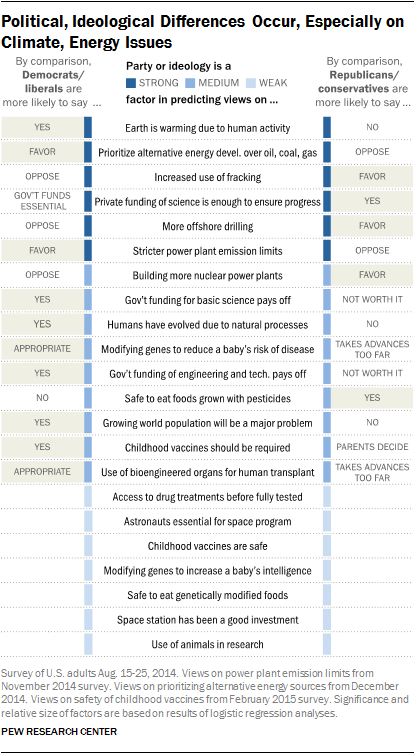
At the global level, liberal Democrats are more inclined than are conservative Republicans to see the growing world population as a major problem because of the food and resource strains such growth would bring: 69% of liberal Democrats hold this view, compared with 44% of conservative Republicans. A 54% majority of conservative Republicans say the growing world population will not be a major problem because we will find a way to stretch natural resources (compared with 30% among liberal Democrats who hold view).
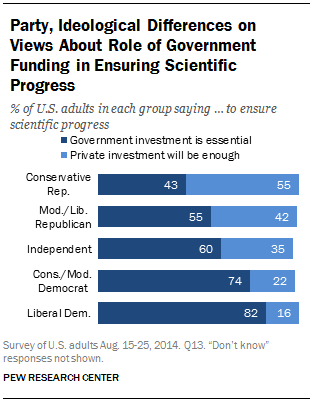
There also are differences among party and ideological groups when it comes to the role of government in funding science and engineering research. The Pew Research survey asked respondents to choose among two options: whether government investment is essential for scientific progress or whether private investment will be enough to ensure that progress is made even without government investment. Among U.S. adults overall, 61% said government investment is essential and 34% said private investment would be enough. These views differ strongly across the party and ideological spectrum, however. A majority of conservative Republicans (55%) say private investment will be enough to ensure scientific progress, and 43% of this group says that government funding is essential. By contrast, an overwhelming majority of liberal Democrats (82%) say government funding is essential, just 16% say private investments, without government funds, will be enough to ensure scientific progress.
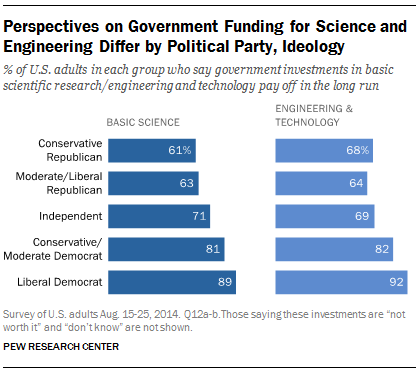
Overwhelming majorities of liberal Democrats say government investments in basic scientific research (89%) and engineering and technology (92%) pay off in the long run. Among conservative Republicans, those figures are lower (61% for basic science and 68% for engineering and technology) with a sizeable minority of this group saying that such investments are “not worth it.” Majorities of all major party and ideological groups say there are benefits from government research funding in both basic science and engineering, however.
There are times, though, when party and ideology have minimal influence on other topics
People’s party affiliations and ideological views play a less-central role in explaining their attitudes on some other science-related topics. When it comes to beliefs about evolution, for example, Americans’ political leanings are just one of several influences underlying their beliefs. And when it comes to whether childhood vaccines, such as the MMR, should be required or a decision left up to parents, adults’ political differences are somewhat associated with their attitudes, but these differences are not as central to explaining such attitudes as age. Younger Americans are more likely than their elders to support the idea that parents should be allowed to keep their children out of immunization programs.
On a host of other science-related topics, people’s differences by party affiliation and by ideological leanings are only modest explainers of opinion differences, or not statistically significant. These include views about:
- The safety of genetically modified foods
- The appropriateness of performing genetic modifications to make a baby more intelligent
- The appropriateness of performing genetic modifications to reduce a baby’s risk of serious diseases
- Views about using bioengineered artificial organs for transplant in humans
- The safety of childhood vaccines for healthy children10
- Whether patients should get access to experimental drug treatments before the treatments have been shown to be safe and effective
- Opinions about using animals in scientific research
- The benefits to the country from investments in the space station
- Whether astronauts are essential in the future U.S. space program
Age and Generational Differences
Public attitudes about science topics vary across generational groups on climate and energy issues and occasionally on other topics, such as views about childhood vaccines. But, there are other science-related topics about which younger and older adults hold roughly similar points of view.
Older adults are less likely than younger adults to say the Earth is warming due to human activity. This pattern holds even after controlling for political party and other factors. In keeping with this finding, older adults are also less inclined to favor stricter power plant emission limits in order to address climate change.
On energy issues, older adults are more likely than younger adults to favor allowing more offshore drilling and building more nuclear power plants, even after controlling for party and other factors. Those ages 65 and older also tend to express more support for increased fracking, although age is not statistically significant once other factors are controlled.
On evolution, older adults are less likely than their younger counterparts to believe that humans have evolved through natural processes such as natural selection. These differences hold even after controlling for differences in religious affiliation and attendance across the generations. Older adults are also less likely than younger adults to consider scientists in agreement about evolution.11
Differences by age are particularly pronounced on views about childhood vaccines. Older generations (those ages 50 and older) are more likely than younger ones to say childhood vaccines such as the MMR and polio vaccines should be required. Larger minorities among those under age 50 say parents should be able to decide whether or not to vaccinate their children. In a separate Pew Research survey, a similar, though more modest, pattern occurred in judgments about the safety of childhood vaccines.
Older adults tend to express more support for using animals in scientific research, when controlling for other factors. But when it comes to the idea of changing a baby’s genetic characteristics in order to reduce the risk of serious diseases, older adults are more likely than younger ones to say this would be taking medical advances too far.
Younger and older adults share similar perspectives about the safety of foods grown with pesticides and the safety of GM foods. And there are no age differences in views related to government funding of science and engineering research, once other factors are controlled.

Educational Attainment and Science Knowledge
One widely discussed idea about public attitudes about science is that educational differences play a central role in people’s beliefs about science topics. Indeed, some scientists and journalists maintain that public attitudes toward science-related issues would more align with scientists’ views if this “knowledge deficit” were addressed through better education and public-awareness campaigns.
Other research has shown there is a strong correlation between more education and greater knowledge about science and scientific processes. Those with more education or more science knowledge are expected to hold attitudes that are in greater alignment with that of science textbooks and scientific experts.
Education and knowledge have been found in prior studies to correlate with interest in and attention to science information. Indeed, analyses conducted by the National Center for Science and Engineering Statistics show that those with a college or graduate-level degree tend, on average, to know more science facts and show a better understanding of scientific processes.12 Those who took three or more college-level courses in science and math are particularly likely to answer factual knowledge questions about science correctly and to demonstrate a higher level of understanding about scientific methods, according to that analysis.
Some scholars, though, have often characterized the relationship between knowledge and attitudes about science as relatively weak. In a well-known meta-analysis, Nick Allum, a professor of sociology at the University of Essex, and his colleagues describe a consistent but modest relationship between knowledge and attitudes about science topics across some 193 studies conducted across 40 countries.13
The Pew Research survey allows us to explore these issues because it included measures for each of these concepts: education, college-level training in science fields and factual knowledge about science. Training in science is based on respondents’ self-report of holding a degree in a scientific field at the college level or higher. Science knowledge is measured using a six-item index of factual knowledge questions. The six questions can be found in Appendix A and B. Those who answered five or six of the questions correctly (47%) are classified as having more science knowledge; all others (53% of those surveyed) are classified as having less knowledge. (See Appendix A for more details.)
The differences in views of science issues by education and knowledge level are substantial on some topics. Those who hold postgraduate degrees are especially likely to express views that differ from those with less formal education. And science knowledge has an independent effect in predicting varying attitudes on several science-related topics, even after controlling for demographic and political differences.
Still, there is no single topic in this set where educational attainment or science knowledge is the sole explanatory factor of attitudes. In one case – the use of animals in scientific research – educational attainment has a strong effect on views. On other topics, education and science knowledge sometimes have a medium influence on attitudes and sometimes have a weak effect, or no particular effect, in understanding public attitudes on these topics.
Issues Where Education and Knowledge Effects Are Strong or Medium
Adults’ views about food safety tend to align with their levels of education and science knowledge. Those with more science knowledge are more likely than those with less knowledge to say eating genetically modified foods and eating foods grown with pesticides are safe. Science knowledge is not the only sizable influence on views about these topics, however. Gender differences are also substantial, with men more likely to consider both GM foods and foods grown with pesticides to be safe.
Americans’ knowledge and education levels also have a sizeable influence on their perceptions of scientific consensus about evolution. A 79% share of those with more science knowledge say scientists generally agree that humans have evolved over time, compared with 54% among those with less science knowledge. Respondents’ own beliefs about evolution also tend to vary by their level of science knowledge.14 Keep in mind, however, that views about evolution also vary strongly by religion, politics and other factors.
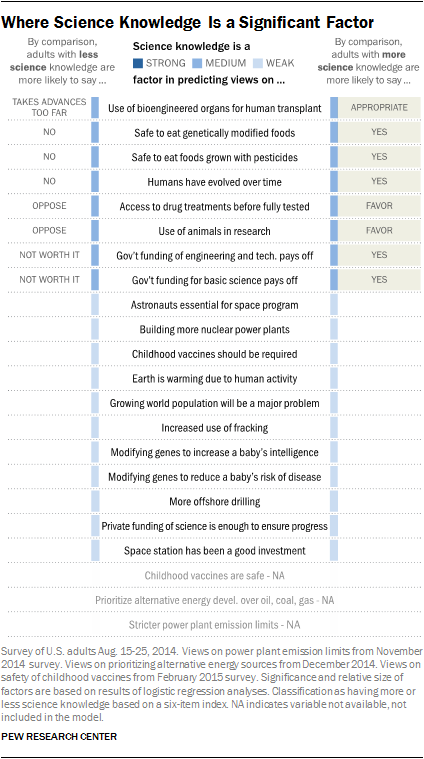
Other topics where noteworthy differences occur among those with different levels of science knowledge include views about the use of bioengineered artificial organs for human transplant, views about the use of animals in scientific research, and opinions about allowing access to experimental drug treatments before clinical trials have shown them to be safe and effective. Those with more science knowledge are more supportive than those with less science knowledge of each of these ideas. The same pattern holds among education groups: Those with a postgraduate degree are especially likely to say bioengineered organs are appropriate and to favor animal research.
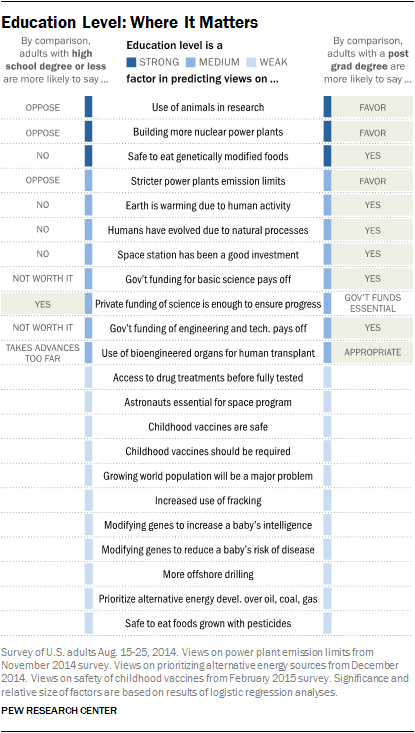
There also are consistent differences among those with different levels of education and science knowledge on issues related to government funding for science. Postgraduate degree holders are particularly likely to see benefits from government investments in basic science research and in engineering and technology. Those with more science knowledge, regardless of educational background, express more support for government funding in science and in engineering and technology. Both education and science knowledge are statistically independent predictors of views about government spending in these areas. Similarly, those with more education are especially likely to consider government spending on the space station a good investment for the country. And those with more education, especially those with a postgraduate degree, tend to consider government funding (as opposed to solely private investment) essential for scientific progress.
Issues Where Educational Attainment and Knowledge Effects Are Weaker or Not Significant
On a host of other science-related topics, differences by education and knowledge are modest or not statistically significant. These include views about:
- The appropriateness of genetic modifications for the purpose of either increasing a baby’s intelligence or to reduce a baby’s risk of serious diseases
- Whether childhood vaccines, such as MMR, should be required or a matter of parental choice
- Whether childhood vaccines, such as MMR, are generally safe for healthy children
- Whether the growing world population will be a major problem from strains on food and resources, or not a major problem because we will find ways to stretch resources
When it comes to energy issues, educational attainment and science knowledge appear to have a limited role. However, those with a postgraduate degree are especially likely to support building more nuclear power plants to generate electricity. Support for building more nuclear power plants also is higher among men, older adults and Republicans or leaning Republicans. Science knowledge is not a significant predictor of Americans’ views about nuclear power, however. There is a modest effect of science knowledge in multivariate models predicting support for the increased use of hydraulic fracturing, but more sizeable differences in views about fracking occur along political and ideological lines. There is no independent effect of education or science knowledge on views about offshore oil drilling.
Gender Differences
There are wide differences of opinion between men and women on a number of science-related topics. Men and women are largely at odds over animal research; a 60% majority of men favor the use of animals in scientific research, while a 62% majority of women oppose it. There also are sizeable gender differences in views about the safety of eating genetically modified foods and the safety of eating foods grown with pesticides. (Men are more likely than women to say both kinds of foods are safe.)
On average, men are more inclined than women to favor building more nuclear power plants, to allow more offshore oil drilling and to increasing the use of hydraulic fracturing techniques to extract oil and gas. These differences are statistically significant even when controlling for political party and other factors.
Holding all else equal, women also are more likely than men to say the Earth is warming (whether due to human activity or through natural processes).
And in one question related to space exploration, women (52%) are less inclined than are men (66%) to say astronauts are essential in the future of the U.S. space program.
On beliefs about evolution, women are somewhat less likely than men to say humans and other living things have evolved over time due to natural processes, even after controlling for differences in religious affiliation and frequency of church attendance. A majority of men and women say the use of bioengineered artificial organs for human transplant is an appropriate use of medical advances; men are, however, more likely than women to hold this view. A majority of both sexes say changing a baby’s genetic characteristics to make the baby more intelligent would be taking medical advances too far, but women are even more likely than men to hold this view. A similar pattern occurs in views about the appropriateness of genetic modifications to reduce a baby’s risk of serious diseases. However, this is a case where the gender difference is not statistically significant once other factors are controlled.
Men and women hold similar views on several topics, however. These include views about:
- Whether childhood vaccines should be required or a matter of parental choice
- The safety of childhood vaccines
- Allowing access to experimental drug treatments before clinical trials have shown the treatments to be safe and effective
- Whether the growing world population will be a major problem from strains on food and resources or not a major problem because we will find ways to stretch resources
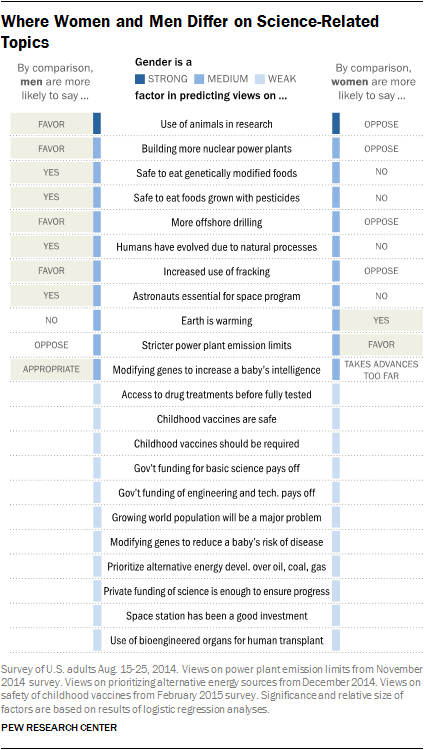
There also are no gender differences on government funding issues related to science and engineering. Controlling for other factors, men and women are about equally likely to say government investments in basic scientific research and in engineering and technology pay off in the long run. They are about equally likely to say the space station has been a good investment for the country. And men and women are about equally likely to consider government funding (as opposed to solely private investment) essential for scientific progress.
Race and Ethnicity
Some science-related topics elicit wide differences of opinion across racial and ethnic groups.
African Americans are less supportive than either whites or Hispanics of allowing access to experimental drug treatments before such treatments have been shown to be safe and effective for a particular condition.15
Compared with either whites or Hispanics, more African Americans take the view that the growing world population will not be a major problem because we will find ways to stretch our natural resources. Fewer African Americans say such growth would be a major problem because there won’t be enough food and resources.
African Americans are less likely than whites to prioritize development of alternative energy sources over increased production of oil, coal and natural gas.
After controlling for other factors, African Americans are less inclined than whites to favor stricter power plant emission limits in order to address climate change.
African Americans also are less likely than whites to say childhood vaccines are generally safe for healthy children.
Hispanics’ views are particularly distinct from those of whites on one topic. Seven-in-ten Hispanics say the Earth is warming mostly because of human activity, compared with 44% of non-Hispanic whites.16
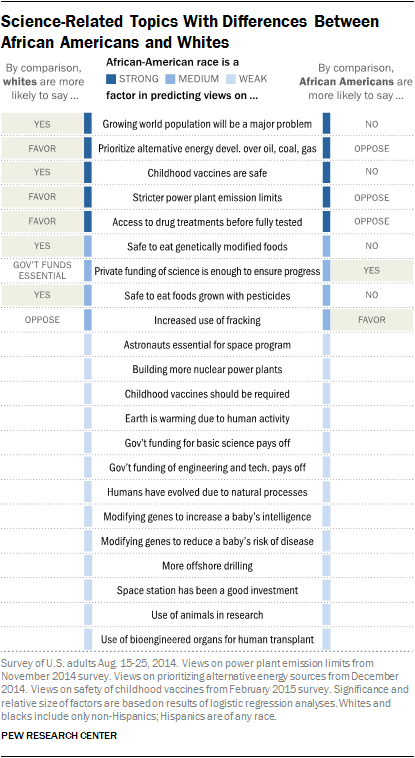

Religious Affiliation and Church Attendance
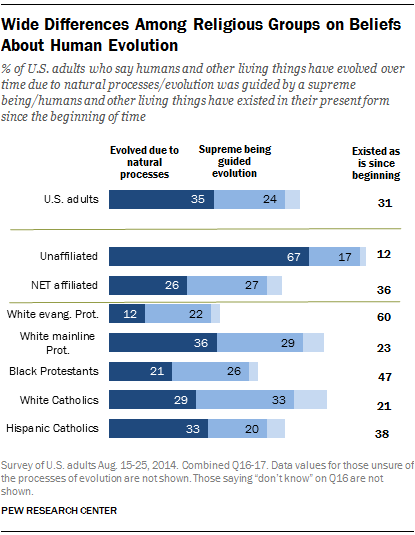
On a handful of topics, religious factors are central to public views. Foremost among these are beliefs about human evolution. An overwhelming majority of those who are religiously unaffiliated say humans have evolved over time and most say evolution occurred through natural processes, such as natural selection (67% of all unaffiliated). By contrast, 36% of white evangelical Protestants believe humans have evolved over time, while 60% say humans and other living things have existed in their present form since the beginning. Black Protestants are closely split, with 49% saying humans have evolved and 47% saying humans have existed as is since the beginning.
To be sure, other factors – especially politics and education – play an important role in adults’ beliefs about human evolution. Still, religion is among the strongest predictors of views about evolution even when accounting for other influences.
Similarly, religious group differences are particularly strong determinants of whether people perceive the existence of a scientific consensus about evolution and the creation of the universe.
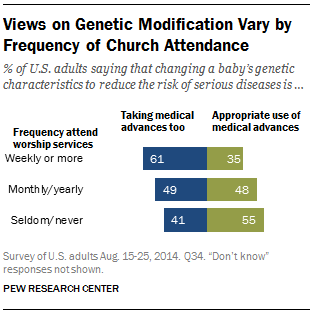
In addition, there are a handful of biomedical topics where differences in religious observance, as measured by frequency of worship service attendance, play a sizeable role in shaping views. One such example concerns views about whether genetic modifications in order to reduce a baby’s risk of serious diseases would be an appropriate use of medical advances. A majority of those who regularly attend worship services (61%), regardless of the particular religious tradition, say genetic modification for this purpose would be “taking medical advances too far.” By comparison, 41% of those who seldom or never attend worship services say genetic modification for this purpose would be taking advances too far; a 55% majority say this would be an appropriate use of medical advances.
But on a number of other science-related topics, there is no independent effect of religious affiliation or frequency of church attendance on attitudes, once demographic and political background differences are taken into account. A follow-up report will go into more detail on religious groups’ views about all of these topics.




